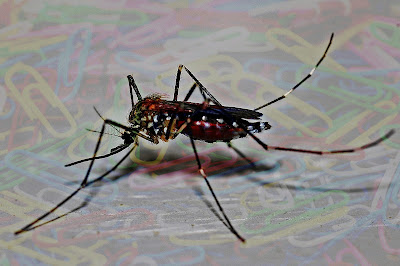What do mosquitoes have to do with management?
This was originally posted on LinkedIn Pulse on January 17, 2016.
The most important lesson we can learn from observing these insects is that we need to know the mosquito better before we can build a better mosquito trap - and this applies perhaps to all our challenges.
I am convinced that even
if there is only one mosquito left in the world, it is sure to come and get me.
Because of this dread, I have always grudgingly admired the single-mindedness
and efficiency with which genus anopheles unfailingly zooms in on someone like
me.
It is perhaps this
curiosity which piqued my interest in a recent report in the The Atlantic magazine about the
quest to find a better mosquito repellent. This article not only explained to
me why mozzies think of me as their Lord Voldemort. But after reading it I felt
also that there may be a few lessons too for the corporate world apparent from
the life and times of the humble mosquito.
Know your
customers, the marketplace
Leslie Vosshall at the
Rockefeller University realised, as reported by The Atlantic, that her team will succeed in their objective only
after better fathoming her enemy. She observes, “We didn’t know enough about
the mosquito. We shouldn’t be playing around with making repellents yet. We
need to figure out what they’re doing before we figure out how to intervene.”
This shows yet again how vital it is to thoroughly understand your adversary,
whether it is your antagonist in war, competitor or customer. In Lao Tzu’s
oft-quoted dictum, “If you know the enemy and know yourself, you need not fear the result of
a hundred battles.” It is
moreover essential to also grasp - particularly in a marketing milieu - the
unique needs and drivers of your market as a whole and the customers who
populate it. This knowledge is fundamental to identifying the specific niche
where our products can thrive. Vosshall explains how a mosquito acts as a
“human-seeking machine”. Evolution has provided the insect the ability to reach
this food source - us - by tracking the warmth of our bodies and the smelly
chemicals exuded by our skins. Similarly, a business can thrive by working out
how to become “customer-seeking machines”.
Always have a plan B
 |
| Stefano Novo, "The Difficult Decision" (1900), Public Domain Wikimedia Commons |
When
trying to fight the mosquito, a narrow focus on one sensory pathway is doomed
to failure. This is because they use so many different cues to track
their prey. Leslie Vosshall lauds it as an “incredibly smart strategy.” From
the mosquito’s point of view, “there are a lot of unreliable signals in nature,
so they integrate multiple pathways.” As they say, “the best laid plans of mice and men
often go awry.” In a corporate scenario - as in everything else in life - no strategy
comes with a 100% guarantee of success because of the threats that confront us.
It is hence always good to have an alternative plan in the back-pocket.
Have ability
to survive, adapt
A feature of the mosquito
that the Atlantic article doesn’t discuss - at least not directly - is their
survival skills. Before we dismiss them as just another insect, it will be
prudent to remember that they have been around for more than 200 million years.
Furthermore, they have been able to confront nature’s odds and adapt to change
incredibly well. There are today around 2,500 species of mosquitoes each
uniquely suited to its habitat. An example of this feat of biological
acculturation is the fact that the human blood group most favored by
mosquitoes is O. (So, if your blood group is O, bad luck!) This is
also a clear-cut evolutionary advantage as O positive is considered the most common blood group. As reported
by the National Geographic, they have even adapted better and more
quickly to climate change than us. What is even more incredible is this
adaptation is ongoing, as reported by Science Daily. Mosquitoes are thus
telling us that an ability to survive and thrive depends on how nimble we are
on our feet in an evolutionary sense. The corporate world is strewn with
examples - such as the American automobile industry that kept churning out gas-guzzlers
even as the oil crisis was gathering speed - where businesses have disappeared
as they failed to move with the times.
Lastly, Ralph Waldo Emerson is supposed to have observed that “build a better mousetrap and the world will beat a path to your door”. The most important lesson we can learn from observing mosquitoes is that we need to know the insect better before we can build a better mosquito trap - and this applies perhaps to all our challenges.
Main Image Credit:
Photos of mosquito and paperclips (in the background): Public Domain via Pixabay. Photo composite: Author.
Main Image Credit:
Photos of mosquito and paperclips (in the background): Public Domain via Pixabay. Photo composite: Author.



.jpg)
Comments
Post a Comment